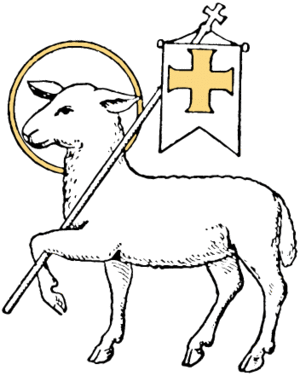Parishism
| Parishists | |
|---|---|
| Parishistas | |
 The Lamb of God, a symbol associated with Parishism | |
| Classification | Protestant |
| Theology | Parishist |
| Polity | Congregationalist |
| Founder | August Roel |
| Branched from | Orthodoxy Church of Ebrary |
| Other name(s) | Roelists |
Parishism is one of the major branches of Amendantism that identifies with the doctrine of Christianity and was founded by August Roel, the 16th-century Ebrarian reformer whose efforts to reform the theology and practice of the Ebrarian church launched the Amendant Reformation. During the Amendant Reformation, Roel founded the Parishist church in Ebrary but subsequently fled to Vorstland and Parishism became the state religion of the Kingdom of Vorstland. Parishist clergy became civil servants and the Parishist churches became part of the Vorstish state.
Parishism is defined primarily by a congregationalist church government and its adherence to the Book of Dedication (Libro de Dedication) written by Roel to outline the doctrine of the Parishist movement. Parishists are trinitarian. While Parishists are not iconoclasts strictly speaking, the Book of Dedication cautions against the overemphasis on icons such that they "do not turn into idols", which is generally interpreted to mean that religious artwork depicting Biblical figures or other people should not occupy a center place in the church building.
Theology
Book of Dedication
Parishist theology is outlined in the Book of Dedication, which was put together and published by a council of leaders of the Church of Vorstland after Parishism was created the state religion of Vorstland. The Book of Dedication (1558) contains the Skalia Confession,Parishist Apology, and Latter Epistles by August Roel, as well as the Treatise on the Office of Bishops and the Vorstish Creed both by other authors. The Latter Epistles were a collection of letters written by August Roel to various congregations or Vorstish nobles which were compiled to be included in the Book of Dedication, and the Vorstish Creed was compiled for the purpose of inclusion in the book.
Major tenets
Sacraments
Parishists respect the sacraments of baptism, communion, anointing of the sick, and marriage. They reject chrismation, holy orders, and penance, as sacraments.
Church structure
Parishists believe the only scripturally sound mode of church organization is congregationalist, where each parish governs itself. Parishists also hold that each parish must join in association or union with other Parishist churches of their region or nation. These associations have powers granted to them by the individual parishes.
Major denominations
Church of Vorstland
The Parishist Church of Vorstland is a continuation of the former state church of Vorstland. The church is headed by the President and the All Vorstland Convention. The Vorstish Church allows self-governance of individual congregations in line with a congregational polity. The church traces its roots to Parishist congregations founded by August Roel and his followers when the fled to Vorstland. The majority of the inhabitants of Vorstland are members of the church.
Ebrarian Parishist Union
The Ebrarian Parishist Union is the largest Parishist denomination in Ebrary outside of Vorstland. It was founded in 1842 after the merger of the Ebrarian Parishist Church and the Western Parishist Union. It is headed by its own Governor and a Church Senate. The Ebrarian Parishist Union is in full communion with the Church of Vorstland, and both churches have roughly the same theological positions. However, merger or union has been prevented by linguistic and cultural differences.